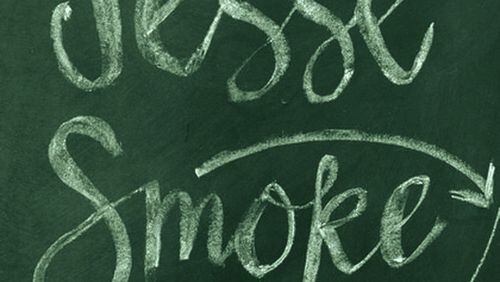FICTION
“The Legend of Jesse Smoke”
By Robert Bausch
Bloomsbury
$28, 400 pages
The NFL needs a Hail Mary, fast.
This fall’s startling dip in television ratings has sparked a fresh round of finger-pointing among worried insiders who blame the lackluster viewership on everything from Deflategate to Donald Trump.
The dustup over players boycotting the national anthem hasn’t helped fan burnout, nor has the endless headlines involving domestic violence and the ongoing concussion crisis.
Written before those controversies reached full broil, “The Legend of Jesse Smoke” nevertheless sheds light on some of football’s prickliest issues: gender inequality and the culture of violence. Robert Bausch’s energetic new fantasy novel imagines an expanded NFL in the not-so-distant future, a time when Super Bowls are no longer numbered and fan engagement is stronger than ever.
The same can’t be said of Skip Granger, a former Atlanta Falcon who’s settled into midlife languor as an assistant coach for the Washington Redskins. Bored on a beach in Belize, he watches a tall, “mixed race maybe” woman in her early 20s hurl a football with the force of any all-star. The chance encounter sets in motion Jesse Smoke’s rise from women’s league rookie to becoming the first female quarterback in the NFL and an instant celebrity “more famous than the first lady.”
Skip’s first-person narration takes place several years later, his attempt to “set the record straight.” Bausch makes masterful use of this device, contrasting the official version of events with Skip’s behind-the-scenes view.
When his boss, Coach Engram, introduces Jesse to the team, one incredulous player scoffs. “We in a [expletive] movie or somethin’?” The remark proves to be prescient — Skip has lots to say about the eventual Hollywood biopic, “The Eyes of Jesse Smoke” — and it also offers an extra-textual nod to the shape of the novel. Readers can’t help but notice parallels to countless underdog sports movies, from “The Natural” to “Million Dollar Baby.”
Those similarities may be intentional. Bausch, a Georgia native and twin brother of author Richard Bausch, got a nibble of fame when his third novel, “Almighty Me!” was adapted into the Jim Carrey comedy “Bruce Almighty.”
Despite the positive response to his early books, Bausch broke ties with his agent in the late 2000s after a series of rejections. An editor who passed on “The Legend of Jesse Smoke” suggested Bausch revamp it as a young adult novel. He took at least part of the advice to heart, giving “Smoke” a complete rewrite then self-publishing it and another book. He eventually sold the manuscript to Bloomsbury, who’d picked up his well-received 2014 Western, “Far as the Eye Can See.”
It’s hard to imagine “Jesse Smoke” as appropriate for young readers, given the scandals that erupt. The plot is basically “Pygmalion” with pigskins: Skip plays Henry Higgins to an orphaned, ambitious protégé, grooming her for the big leagues. The sidekick role is filled by Coach Engram, who reluctantly acknowledges her true potential. Unlike Eliza Doolittle, Jesse is less firecracker and more fembot, a detached virtuoso whose “eyes had that steely quarterback’s glint.” Even as she withstands the taunts and unnecessary roughness of other players, her indefatigability can be a little boring on the page. Redemption comes via Skip’s rhetorical reveries. “She was gradually becoming a symbol — of a number of things, actually. To some, she was the embodiment of the ‘new equality’ between men and women. To others, she represented the end of civilization — an interloper destined to ruin the last bastion of male power.”
The tone changes when Jesse turns out to be not so orphaned after all. Her estranged mother surfaces with dubious intentions (another callback to “Pygmalion”). Around the same time, the book’s central line of scrimmage shifts away from its core argument: “Women can play any sport they want,” as Jesse puts it. “If I’m strong enough, if I have the talent, if I move fast enough, then why not?”
Later, the debate over gender and inclusion devolves into a more vulgar indictment of sexuality. Jesse is horrified by false tabloid reports of tawdry affairs with her coaches and teammates. Skip’s fear that Jesse might be seen as a “freak in a football uniform, a curiosity” is realized when allegations emerge that she’s transgender. This comes after a telling scene that demonstrates the league’s entrenched homophobia. Sadly, the novel has a tendency to introduce uncomfortable topics then switch the channel to rain-drenched fields and endless play-by-plays.
Skip’s descriptions at the start of the novel are a notch below breathless when he compares Jesse’s talents to the likes of Tom Brady and Brett Favre. Soon, she’s Jackie Robinson and Joe Louis — game-changers. By the finale, she’s Joan of Arc and Jesus.
Like an anxious father, Skip studies the fragile bones in Jesse’s neck and imagines that every time she gets sacked on the field, she won’t get up. The trouble with this protectiveness is that it refutes some of the major themes of the novel. In defense of gameplay, Jesse tells one critic: “Violence is chaotic, like, mostly random. I know it looks chaotic on the field, especially during the heat of a play, but most of the people in a play — they’re doing exactly what they’re supposed to be doing … It turns out all that confusion is really precision. Artistry.”
In passages like these, “The Legend of Jesse Smoke” makes an elegant, sometimes brilliant, case that football is a “beautiful game” that “allows us to act like heroes, even when what we are engaged in isn’t really heroic.” Yet, when Skip’s worries about Jesse’s safety prove to be justified (in a roundabout way) the reader is left feeling bruised and uncertain. What’s more clear: Misogyny really isn’t a spectator sport. Perhaps even a Hail Mary can’t save this game.






